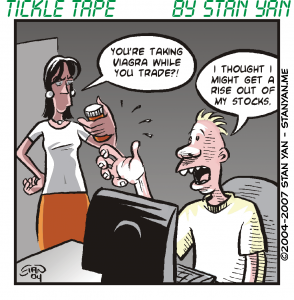Consider a tale of two brothers, Allen and Jason, who decided to go long on Home Depot last January. Although they both made the same decision, they did so for very different reasons. Allen bought stock in Home Depot because his Grandpa Ed, an experienced investor and corporate executive, thought it would be a good investment. Allen tends to blindly follow his Grandfather’s advice.
Jason, in contrast, is much more independent and industrious. He conducted a careful analysis of buying trends, sales, profit growth, and earnings per share. He based his decision solely on his own detailed analysis. Home Depot has been falling since March and fell 7% last week due to stiff competition and sluggish sales. Who do you think feels more regret, Allen or Jason?
When asked this question, most people say Jason will feel more regret. Here’s why. We feel regret when we engage in the wrong course of action, and put a lot of our ego on the line when taking that course. We tend to believe that Allen will feel less regret because from his point of view he didn’t have much of his ego at stake when making his decision. He just blindly followed his grandfather’s advice. Rather than feel regret, he can easily accept his loss and think, “It’s not my fault that I lost money on that trade, it’s my grandfather’s fault.”
Jason in contrast feels more regret. By putting his ego on the line, he must face the personal humiliation of having made an inaccurate forecast. He may now question his ability to conduct an accurate analysis or to develop a sound trading strategy. Feelings of regret are painful, and people avoid them at all costs. It often seems as if the easiest way to avoid feelings of regret is to avoid making decisions. If you don’t make decisions, you can’t be wrong or feel regret. Right? Well, that’s what a lot of people think.
It’s rarely true, however. Ironically, research studies have shown when people are asked to reconsider past life decisions, the most regretful are those who either didn’t make their own life decisions or merely followed the opinions of others. So, it’s better to take action now than regret inaction later. People’s thinking tends to be faulty when it concerns regret. They think regret is painful, so they avoid making decisions to curb these feelings.
However, by doing so, they have merely traded short-term immediate feelings of regret for later long-term profound feelings of regret. People who make their own decisions, based on their own opinions or beliefs, may face some regret in the short-term but over the long-term, they are more satisfied with their decisions. The immediate experience of regret is much less painful than we think it will be. Long-term feelings of regret due to inaction are more enduring.
Don’t let the tendency to avoid regret influence your trading decisions. Keep in mind that if a decision leads to an unpleasant consequence, you may feel a little regret, but you can handle it. It’s better to make mistakes, and experience a little temporary regret now, than a lot of profound regret later.


